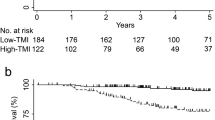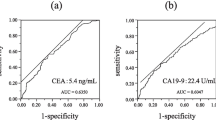Abstract
Purpose
We retrospectively analyzed preoperative levels of carbohydrate antigen (CA) 19-9 in colorectal cancer (CRC) patients to determine the prognostic value of CA19-9 in CRC patients with normal carcinoembryonic antigen (CEA) levels.
Methods
A total of 639 patients who underwent curative surgery at Taipei Veterans General Hospital between 2002 and 2006 were enrolled. We excluded 254 patients (39.7 %) with high preoperative CEA levels and analyzed 385 patients with normal CEA levels. The measured endpoint was the postoperative disease-free survival (DFS). The prognostic value of CA19-9 was determined using log-rank test and Cox regression analysis.
Results
High CA19-9 levels were significantly associated with advanced disease and were detected in 5.8 % of patients with stage I disease, 11.7 % of those with stage II disease, and 22.5 % of those with stage III disease (P < 0.001). The 5-year DFS in patients with normal CA19-9 levels was 82.0 %, which was significantly higher than that in patients with high CA19-9 levels (68 %; P < 0.001). In a multivariate analysis, the most important independent factor affecting the 5-year DFS was tumor–node–metastasis stage (95 % CI, 1.26–2.36; HR = 1.72). After stratification by other factors, high CA19-9 level remained an independent prognostic factor for patients with normal CEA levels. Patients with high CA19-9 levels also showed a higher incidence of lung metastasis (23.1 %) than those with normal CA19-9 levels (7.2 %).
Conclusions
CA19-9 may be a prognostic factor for CRC patients with normal CEA levels. An aggressive follow-up protocol for lung metastasis should be used for these patients.


Similar content being viewed by others
Abbreviations
- CEA:
-
Carcinoembryonic antigen
- CRC:
-
Colorectal cancer
- DFS:
-
Disease-free survival
References
The Department of Health, the Executive Yuan, Taiwan (2007) Cancer registry annual report (December 2007). The Department of Health, the Executive Yuan, Taiwan
Compton CC, Fielding LP, Burgart LJ, Conley B, Cooper HS, Hamilton SR, Hammond ME, Henson DE, Hutter RV, Nagle RB, Nielsen ML, Sargent DJ, Taylor CR, Welton M, Willett C (2000) Prognostic factors in colorectal cancer. College of American Pathologists Consensus Statement 1999. Arch Pathol Lab Med 124:979–994
Desch CE, Benson AB 3rd, Somerfield MR, Flynn PJ, Krause C, Loprinzi CL, Minsky BD, Pfister DG, Virgo KS, Petrelli NJ (2005) Colorectal cancer surveillance: 2005 update of an American Society of Clinical Oncology practice guideline. J Clin Oncol 23:8512–8519
Compton C, Fenoglio-Preiser CM, Pettigrew N, Fielding LP (2000) American Joint Committee on Cancer Prognostic Factors Consensus Conference: Colorectal Working Group. Cancer 88:1739–1757
Bast RC Jr, Ravdin P, Hayes DF, Bates S, Fritsche H Jr, Jessup JM, Kemeny N, Locker GY, Mennel RG, Somerfield MR (2001) 2000 update of recommendations for the use of tumor markers in breast and colorectal cancer: clinical practice guidelines of the American Society of Clinical Oncology. J Clin Oncol 19:1865–1878
Duffy MJ, van Dalen A, Haglund C, Hansson L, Klapdor R, Lamerz R, Nilsson O, Sturgeon C, Topolcan O (2003) Clinical utility of biochemical markers in colorectal cancer: European Group on Tumour Markers (EGTM) guidelines. Eur J Cancer 39:718–727
Locker GY, Hamilton S, Harris J, Jessup JM, Kemeny N, Macdonald JS, Somerfield MR, Hayes DF, Bast RC Jr (2006) ASCO 2006 update of recommendations for the use of tumor markers in gastrointestinal cancer. J Clin Oncol 24:5313–5327
Duffy MJ, van Dalen A, Haglund C, Hansson L, Holinski-Feder E, Klapdor R, Lamerz R, Peltomaki P, Sturgeon C, Topolcan O (2007) Tumour markers in colorectal cancer: European Group on Tumour Markers (EGTM) guidelines for clinical use. Eur J Cancer 43:1348–1360
Lin JK, Lin CC, Yang SH, Wang HS, Jiang JK, Lan YT, Lin TC, Li AF, Chen WS, Chang SC (2011) Early postoperative CEA level is a better prognostic indicator than is preoperative CEA level in predicting prognosis of patients with curable colorectal cancer. Int J Colorectal Dis 26:1135–1141
Nakagoe T, Sawai T, Tsuji T, Jibiki MA, Nanashima A, Yamaguchi H, Yasutake T, Ayabe H, Arisawa K (2003) Preoperative serum level of CA19-9 predicts recurrence after curative surgery in node-negative colorectal cancer patients. Hepatogastroenterology 50:696–699
Chen CC, Yang SH, Lin JK, Lin TC, Chen WS, Jiang JK, Wang HS, Chang SC (2005) Is it reasonable to add preoperative serum level of CEA and CA19-9 to staging for colorectal cancer? J Surg Res 124:169–174
Nozoe T, Rikimaru T, Mori E, Okuyama T, Takahashi I (2006) Increase in both CEA and CA19-9 in sera is an independent prognostic indicator in colorectal carcinoma. J Surg Oncol 94:132–137
Del Villano BC, Brennan S, Brock P, Bucher C, Liu V, McClure M, Rake B, Space S, Westrick B, Schoemaker H, Zurawski VR Jr (1983) Radioimmunometric assay for a monoclonal antibody-defined tumor marker, CA 19–9. Clin Chem 29:549–552
Greene FLPD, Fleming ID, Fritz AG, Balch CM, Haller DG, Morrow M (2002) AJCC cancer staging manual, 6th edn. Springer, Chicago
Magnani JL, Nilsson B, Brockhaus M, Zopf D, Steplewski Z, Koprowski H, Ginsburg V (1982) A monoclonal antibody-defined antigen associated with gastrointestinal cancer is a ganglioside containing sialylated lacto-N-fucopentaose II. J Biol Chem 257:14365–14369
Nakayama T, Watanabe M, Teramoto T, Kitajima M (1997) CA19-9 as a predictor of recurrence in patients with colorectal cancer. J Surg Oncol 66:238–243
Berg EL, Magnani J, Warnock RA, Robinson MK, Butcher EC (1992) Comparison of L-selectin and E-selectin ligand specificities: the L-selectin can bind the E-selectin ligands sialyl Le(x) and sialyl Le(a). Biochem Biophys Res Commun 184:1048–1055
Nakayama T, Watanabe M, Teramoto T, Kitajima M (1997) Slope analysis of CA19-9 and CEA for predicting recurrence in colorectal cancer patients. Anticancer Res 17:1379–1382
Redson M (2001) Carcinogenesis in the GI tract: from morphology to genetics and back again. Mod Pathol 230:309–318
Distler P, Holt PR (1997) Are right and left-sided colon neoplasms distinct tumors? Dig Dis 15:302–311
Thibodeau SN, Bren G, Schaid D (1993) Microsatellite instability in cancer of the proximal colon. Science 260:816–819
Engstrom PF, Arnoletti JP, Benson AB 3rd, Chen YJ, Choti MA, Cooper HS et al (2009) NCCN Clinical Practice Guidelines in Oncology: colon cancer. Natl Compr Cancer Netw 7:778–831
Acknowledgments
This study was supported by a grant from Taipei Veterans General Hospital. (VGH100C-007, VGH100E2-008).
Author information
Authors and Affiliations
Corresponding author
Electronic supplementary material
Below is the link to the electronic supplementary material.
Supplement Table 1
(DOC 32 kb)
Rights and permissions
About this article
Cite this article
Lin, PC., Lin, JK., Lin, CC. et al. Carbohydrate antigen 19-9 is a valuable prognostic factor in colorectal cancer patients with normal levels of carcinoembryonic antigen and may help predict lung metastasis. Int J Colorectal Dis 27, 1333–1338 (2012). https://doi.org/10.1007/s00384-012-1447-1
Accepted:
Published:
Issue Date:
DOI: https://doi.org/10.1007/s00384-012-1447-1




